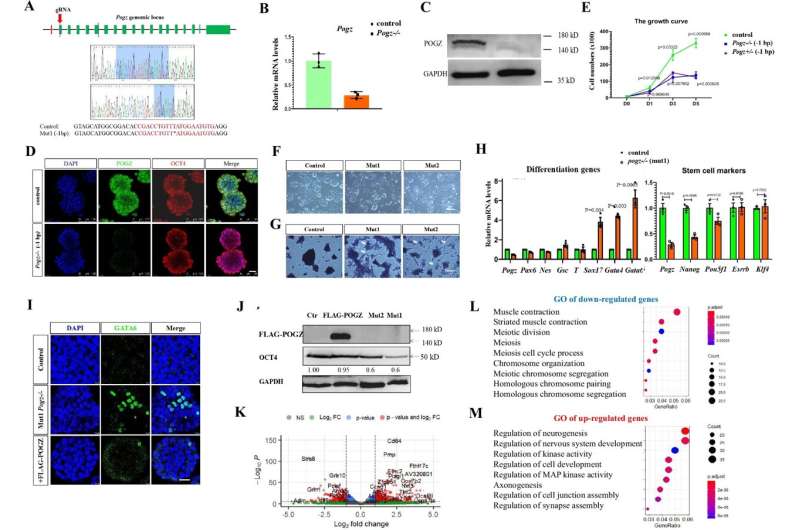
Pogo transposable element derived with ZNF domain (POGZ) is a transcription factor broadly expressed during mouse embryonic development. A high expression level of POGZ in the cortex indicates its important role during brain development.
Similar to activity dependent neuroprotective protein (ADNP), a well-characterized candidate gene for autism spectrum disorder (ASD), POGZ has also been found frequently mutated in neurodevelopmental disorders (NDDs), particularly in White-Sutton Syndrome, Nail Disease, ASD and intellectual disability (ID). However, little is known about its roles in embryonic stem cells (ESCs), neural development and diseases.
Recently, a research group led by Prof. Sun Yuhua from the Institute of Hydrobiology (IHB) of the Chinese Academy of Sciences provides the evidence that POGZ controls the stemness of ESCs and ESC neural induction by association with esBAF. The study was published in Molecular Autism.
In this study, the researchers generated Pogz-/- ESCs and directed ESC differentiation toward a neural fate. They found loss of POGZ impairs ESC self-renewal accompanied by a significant reduction in the expression of pluripotency genes and an increase in the expression of differentiation genes. Importantly, the loss of POGZ suppressed the neural progenitor gene expression, which caused abnormal neural induction and development.
To understand the function of POGZ in the ESCs, the researchers performed biochemistry, ChIP-seq, ATAC-seq, and bioinformatics analyses. Genome-wide analysis showed that POGZ is localized to gene promoter and enhancer regions where it regulates gene transcription.
The researchers further performed IP-Mass Spec experiments and co-IP experiments, and the results showed that POGZ interacts with BRG1 and BAF155, both of which are subunits of esBAF complex. Further analysis revealed that POGZ is co-localized with BRG1 to promoter and enhancer.
In summary, this study demonstrated that POGZ regulates enhancer activity to promote the expression of pluripotent gene through interacting with BRG1 in ESCs. In addition, POGZ recruits esBAF/BRG1 to the enhancer of neural progenitor genes during the ESC neural induction, which is essential for the proper neural induction and development.
The esBAF is known to play a critical role in the self-renewal of neural development. The defects of BAF complex results in the failure of neural development. In this study, the researchers revealed that POGZ physically associates with SWI/SNF (BAF) chromatin remodeler complex and recruits the esBAF to neural progenitor genes during the ESC neural induction.
Chen Na, Chinese Academy of Sciences

